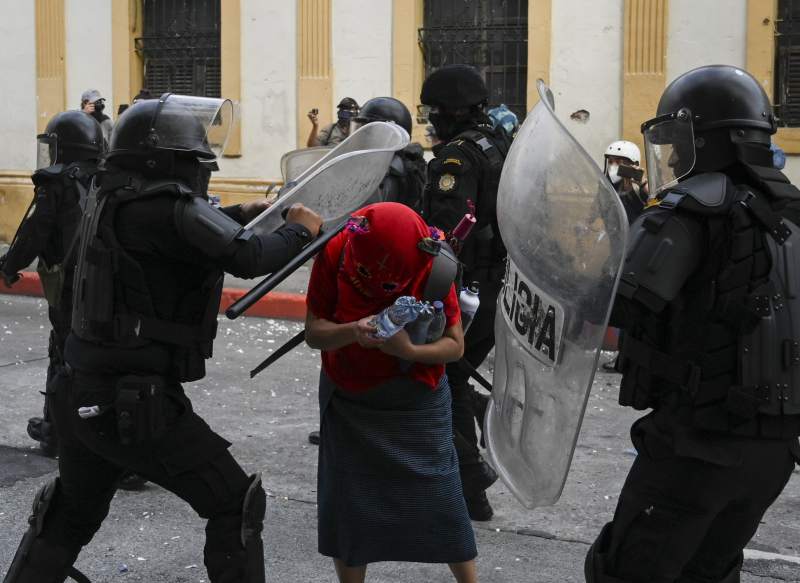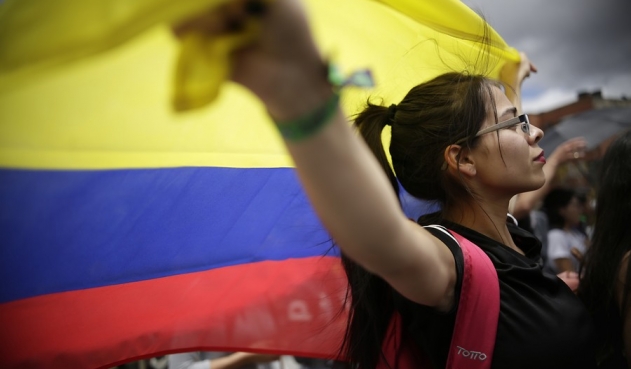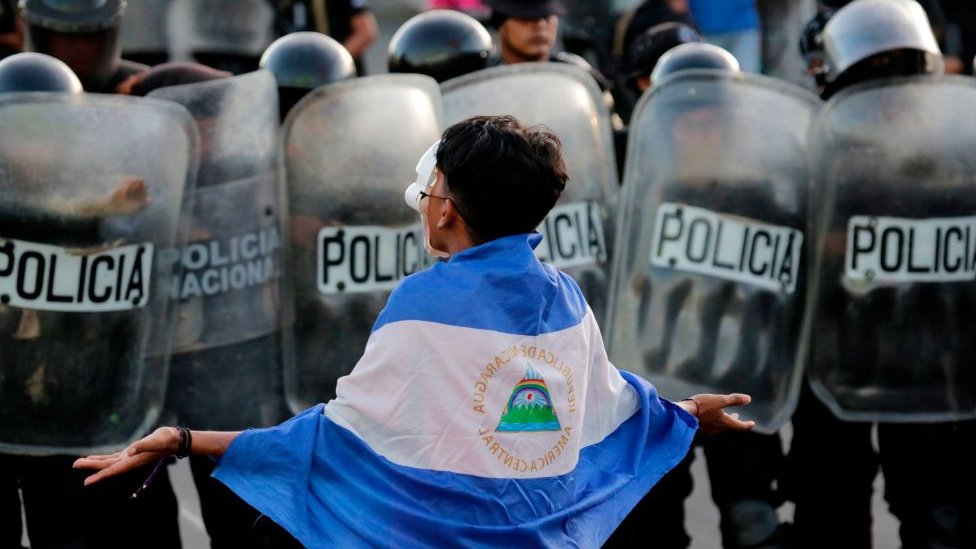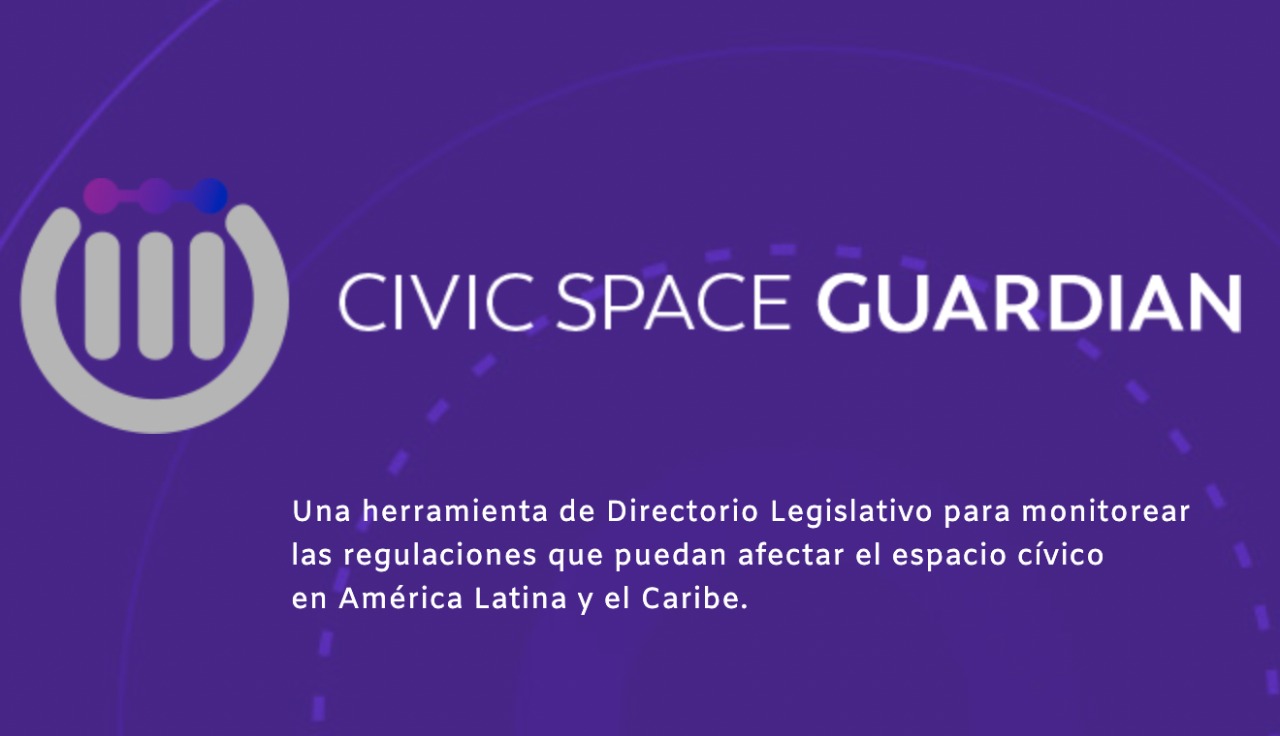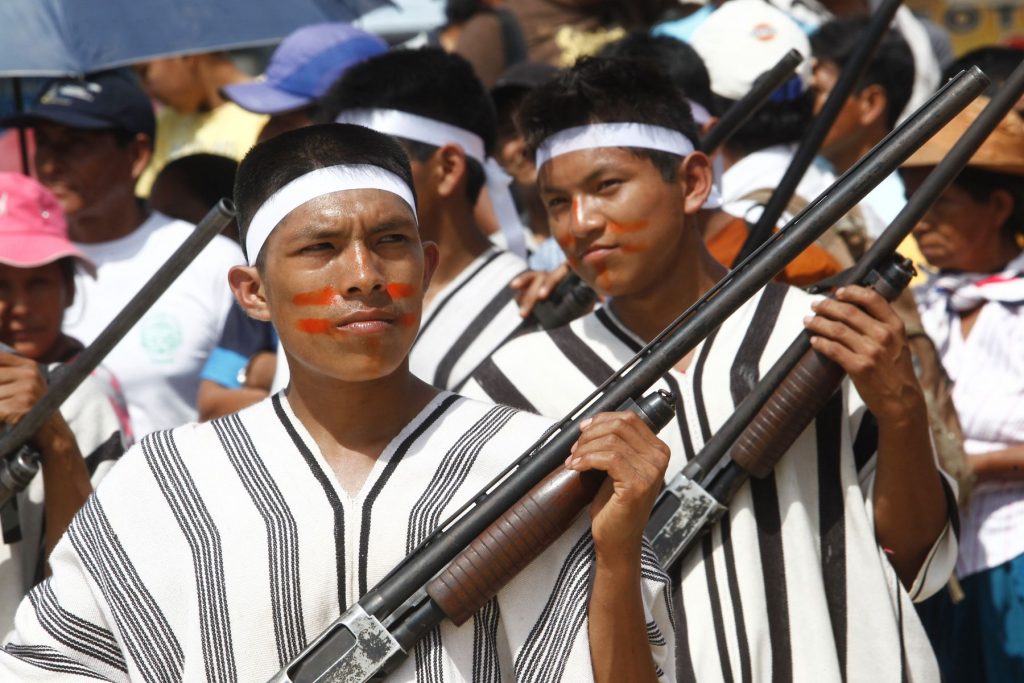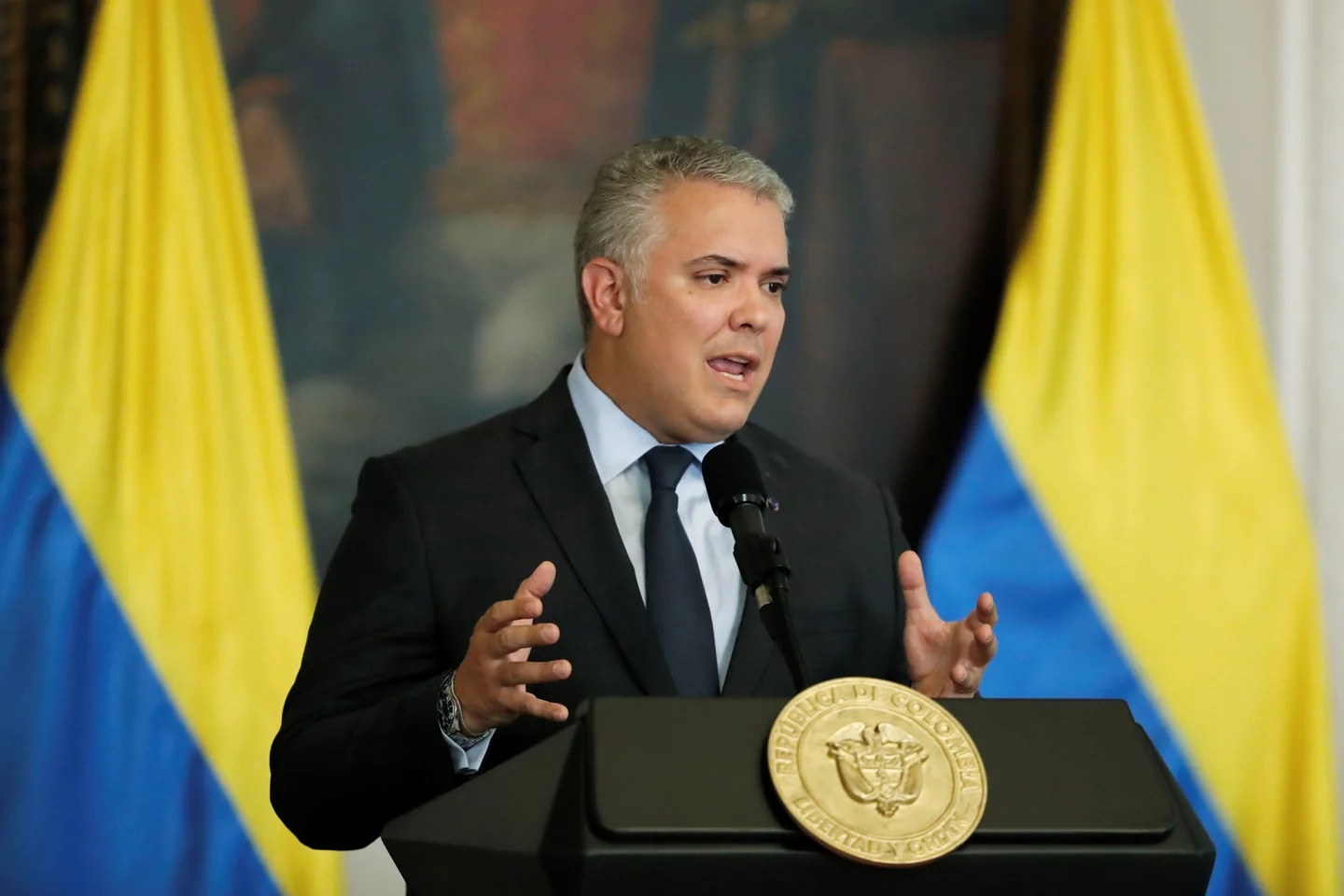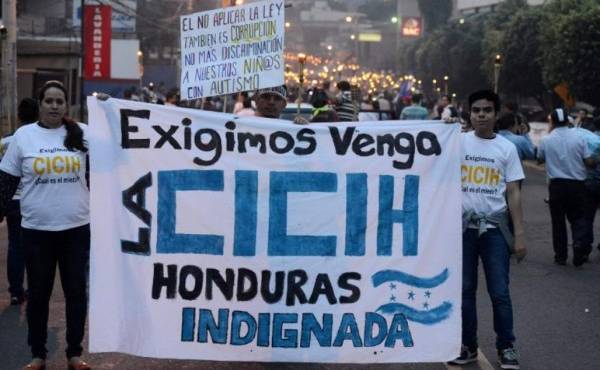
A tool designed by Directorio Legislativo to monitor
regulations with the potential to impact civic space
in Latin America and the Caribbean.
Fundación Directorio Legislativo | November 2020
About Civic Space Guardian (CSG)

Civic Space Guardian (CSG) is a tool designed by Directorio Legislativo to monitor regulations with the potential to impact civic space in Latin America and the Caribbean.
These are regulations affecting freedom of expression, freedom of association, freedom of peaceful assembly, citizen participation and access to public information. To provide a broader overview, we also include the rating assigned by Civicus according to the state of civic space in each country.
Injuries after police clampdown on anti-government demonstrators

Guatemala
Impacto | Negativo
CIVICUS Rating | Obstructed
On November 21, thousands of protesters took to the streets to reject the actions of the Executive branch, demanding the resignation of Giammattei and his vice president Guillermo Castillo. Among the main rallying cries were better usage of public funds to deal with the pandemic and opposition to next year’s proposed budget allocations. A minority of protesters vandalized and set fire to the Congress building prompting the PNC to forcefully clamp down on demonstrators, leading to dozens of injuries from rubber bullets and tear gas.
President Giammattei, addressing the events, chose to focus on the acts of vandalism rather than the crackdown. “I insist on people’s right to demonstrate in line with the law. But nor can we allow vandalization of public or private property. Upon whoever is proven to have participated in these criminal acts will fall the full weight of the law”, said President Giammattei through his Twitter account. In the meantime, the Alliance for Reforms, which is made up of 40 social organizations, called for the “immediate removal of Minister Gendri Reyes and the director of the National Civil Police, José Antonio Tzubán, who issued the order to the police to suppress the protesters, and that the Public Ministry initiate a criminal investigation against him ”. This was echoed by the Inter-American Commission on Human Rights (IACHR), which condemned the excessive police violence and urged the country to safeguard the right to peaceful demonstration.
As a result of the strong social unrest, the Board of Directors of Congress announced the suspension of the legislative process of the 2021 Budget, which is to give way to a national dialogue to ensure ‘social order’ by convening different sectors of the country.
A proposed reform to the Access to Public Information Law advances in Congress threatening to weaken the independence of the body that supervises its implementation

Guatemala
Impact | Negative
Probabilty | Medium
Civicus Rating | Obstructed
The initiative in question was presented in June by legislator José Alejandro De León Maldonado (Podemos), and aims to create a National Office of Access to Public Information modelled on that of the Assembly of the Organization of American States (OAS). However, according to the wording that is being pushed by De León Maldonado this body´s key figures would be appointed by Congress, which has drawn criticism from various officials and civil society organizations because of how it could weaken institutional independence. According to the Association of Journalists of Guatemala (APG, in Spanish), “the creation of this new office has a twofold objective: to restrict access to public information and to use data as political booty”. For his part, Vice President Guillermo Castillo also spoke out against the initiative, arguing that “none of the three branches of government should make decisions about its functioning”.
Although the promoters of the bill expressed their intention to achieve the necessary consensus to approve the law as soon as possible, the issues that currently make up the legislative agenda of the plenary session have created conflict and led to deadlock. As such, it is not expected this article will be debated this year but rather in the course of 2021.
Executive Branch accused of creating parallel institutions to fight corruption

Honduras
Impact | Negative
Civicus Rating | Repressed
On November 6, President Juan Orlando Hernández created by decree the Secretariat of Transparency, an entity within the Executive branch authorized to take complaints from citizens and investigate alleged acts of corruption in public administration. Civil society and the Institute of Access to Public Information warned the decree would violate Article 3 of the General Law of Public Administration, since the functions of the Secretariat would duplicate the powers currently held by the Public Ministry and the Court of Accounts. On the other hand, the decree also establishes the National Council of Transparency and Accountability (CNT, in Spanish), an entity to be made up of the government, civil society, the private sector, and academia. Various social organizations have accused the Executive Branch of trying to set up an institution parallel to the National Anti-Corruption Council (CNA, in Spanish), a civil anti-corruption body.
New IAIP commissioners appointed by President Bukele keep their asset information hidden

El Salvador
Impact | Negative
Civicus Rating | Obstructed
Officials of the government of Nayib Bukele are pointed out as guilty of harassing journalists in a report of the National Assembly

El Salvador
Impact | Negative
Civicus Rating | Obstructed
On November 12, the plenary session of the National Assembly approved the final report prepared by the Special Committee that investigated harassment of journalists by the Executive Branch. It identifies as the main culprits the President himself, Nayib Bukele, the Press Secretary of the Presidency, Ernesto Sanabria, and the president of the Autonomous Port Executive Committee (CEPA, in Spanish), Federico Anliker.
The legislators who form part of the committee heard the testimonies of journalists from digital and written media, independent journalists and representatives of the Association of Journalists of El Salvador (APES, in Spanish). The approved report points to not only harassment by the Executive Branch of media that has been critical of the administration, but also the blocking of access to public information and the use of public resources, such as government accounts in social media and arbitrary tax audits by the Ministry of Finance, to persecute journalists and opponents. Likewise, the use of cyberspace as an increasingly frequent means of harassment was highlighted. The report’s conclusions also relate to the government’s advertising guidelines for all media, regardless of their political stance, and signal the initiation of an investigation into alleged crimes committed by the Attorney General’s Office. On the other hand, Deputy Emilio Corea (ARENA – opposition) considers it important that the Assembly also approve the bill for the Protection of Journalists in order to offer a legal tool to this group to have protection from harassment.
New regulation approved in Assembly establishes that restrictions on fundamental rights must only be for public health reasons

El Salvador
Impact | Negative
Probability | Medium
Civicus Rating | Obstructed
The Ministry of the Interior established a protocol to regulate demonstrations that could restrict the right to freedom of protest

Colombia
Impact | Negative
Probability | High
Civicus Rating | Repressed
The resolution approved by the Ministry of the Interior on October 20, establishes that the protesters must meet with the mayors and governors to explain the reason for the demonstration, in addition to establishing that the police must identify who its leaders or organizers are. Although this regulation is already in force, it is set to be a stopgap measure while the process of preparing another protocol is finalized, which for its part will reflect the ruling issued by the Supreme Court of Justice and specify the way in which the Public Force may apply force in the face of protests.
The protocol also envisages creating a ‘Unified Command Post’ (PMU, in Spanish), a body that will include representatives of the Attorney General’s Office, Migration Colombia, the Colombian Institute for Family Welfare, the Ombudsman’s Office, the Attorney General’s Office, and the District or Municipal Representation. The protocol also puts an obligation on mayors and governors to convene the leaders of the protests in advance, to learn more about the planned action.
Meanwhile, the National Police must identify possible actors infiltrated in the demonstrations, as well as threats or disturbances of public order in advance. When violent acts occur that endanger life or private property, this force may act and intervene according to the principles of necessity, gradualism, proportionality and rationality. On the other hand, protesters will have to report the route they plan to take, the time-frame, and the estimated number of participants. As for the purpose of the demonstrations, these cannot be ‘illegitimate’.
Social and human rights organizations have called for civil society representatives to form part of the PMU set out in the final protocol. Additionally, the Bogotá Oversight Office affirmed that only the legislative branch should be able to determine which reasons for protests are legitimate or not, and the Mayor of Bogotá, Claudia López, criticized the measure saying that from now on, protesters should “ask for permission to demonstrate”.
Illegal espionage of social organizations denounced through the Law of Foreign Agents

Nicaragua
Impact | Negative
Probability | High
Civicus Rating | Repressed
On October 30, representatives of the Permanent Committee on Human Rights (CPDH, in Spanish) of Nicaragua and the Organization Víctimas de Abril (OVA) presented before the Supreme Court of Nicaragua an appeal of unconstitutionality against the Law of Regulation of Foreign Agents that limits the action of organizations that receive international funding. According to these organizations, the legislation undermines citizens’ independence and self-determination since it narrows down financing options to assist political prisoners and victims of state repression.
The regulation was promoted by the Frente Sandinista de Liberación Nacional (FSLN) in September and promulgated by the President of Nicaragua, Daniel Ortega, on October 19. It obliges all entities, foundations and associations that receive funds from abroad to register as “foreign agents”.
In addition, each time they receive an offer of funds they must inform the Ministry of the Interior of the activities for which they will be used and report on the expenses, payments and contracts related to them. It also establishes that if they do not comply, the Ministry may fine them or strip them of their legal status. Since 2018, the Nicaraguan government has annulled the legal status of 10 civil society organizations without respecting due process. It is expected that the Supreme Court will rule on this matter in the next months.
Congress moves forward on a proposal to eliminate the broadcast of audiovisual content without a court order

Uruguay
Impact | Negative
Probability | High
Civicus Rating | Open
The 2020-2024 Budget bill advances in the Senate. The bill already has the backing of Deputies and is expected to become law by the end of November. In addition to accounting for the State’s expenditures and revenues for that period, the bill seeks to expand the powers of the Regulatory Unit of Communication Services. If its current wording is approved, this agency will have the power to remove online content without the intervention of an independent authority to analyze other evidence beyond that submitted by the complainant. Currently, the budget bill is being studied by the Senate Finance Committee.
In a letter presented to Congress, 20 organizations, including Amnesty International, warned that the proposed mechanism to protect copyright is disproportionate and that it endangers fundamental rights. The wording of the article, furthermore, indicates that the implementation of the measure will be subject to subsequent regulation by the Executive Branch. The Latin American Observatory for Media Regulation and Convergence (OBSERVACOM, in Spanish) states that this issue “cannot be left to the discretion of a government”.
A bill that punishes hate crimes with life imprisonment advances in the Assembly

Nicaragua
Impact | Negative
Probability | High
Civicus Rating | Repressed
On November 10, the Plenary of the National Assembly gave its initial approval to proposals to reform article 37 of the National Constitution in order to punish hate crimes with life imprisonment. Currently, the maximum penalty for this established in the Penal Code is 30 years. Both criminal law specialists and representatives of the opposition fear that, if successful, the government could use the new sanctioning regime to limit freedom of expression and the right to protest.
Although the current Penal Code does not classify hate crimes (including violent actions and discrimination that is based on religion, gender or sexual orientation), it does view ideological or political discrimination to aggravate criminal responsibility. If this bill is approved, life imprisonment could be imposed on those deemed to commit serious crimes “in hateful, cruel, degrading, humiliating and inhuman circumstances, which due to their impact cause shock, rejection, indignation or disgust in the national community.”
The proposed regulations had been approved by the Special Constitutional Committee on November 4. As this is a constitutional reform, to be implemented by the Executive Branch, the initiative will have to be dealt with again next year by a new-look legislature starting off in January 2021.
President of Guatemala halts organizations favoring abortion

Guatemala
Impact | Negative
Civicus Rating | Blocked
Civil society organizations have denounced through a statement the “arbitrariness in actions that weaken democracy and violate the rights of association and organization.” The Executive Branch justified the move arguing the organization´s work did not match the interests of the State, with Planned Parenthood, an organization providing information and resources on reproductive health to both women and men, known to support women´s right to abortion.
Giammattei, from his Twitter account, declared that he would not endorse the creation, registration or starting up of any organization that “goes against life.” Planned Parenthood had been authorized to operate in Guatemalan territory because it met the requirements established by law and had obtained approval from both the Department of Legal Affairs of the Ministry of the Interior and the Office of the Attorney General of the Nation.

Voices of civil society
INTERVOZES – BRAZIL
Olivia Bandeira – Executive Coordinator
As part of an event to analyze a document with recommendations from civil society regarding the use and access to information technology and communication platforms, Olivia Bandeira, executive coordinator of Intevozes, pointed out the importance of defending “a democratic, free and open internet model” that understands the “need to guarantee freedom of expression in the face of the current internet model”. At the same time, she highlighted the importance of promoting “regulation to protect freedom of expression and non-discrimination in the face of private moderation of content that platforms make without any public control, without transparency”.
11/27/2020
FUSADES – EL SALVADOR
Javier Castro – Director
In the over 7 years of existence of the IAIP, its current notorious levels of regression have not been seen before, leaving the right of access to information unprotected. Hopefully, the IAIP will return to the path of ensuring maximum publicity and fulfilling its role as a guarantor”. Statement by Javier Castro, Director of Legal Studies, of the Salvadoran Foundation for Economic and Social Development (Fusades, in Spanish), made through Twitter. The remarks were in relation to the problems in El Salvador regarding complaints of violations of the right to access public information by the government-appointed commissioners to the IAIP.
11/10/2020

Information of Interest
Nicaragua
On November 2, the IACHR issued a resolution, by which it granted precautionary measures of protection in favor of 41 persons who are deprived of their liberty for political reasons, after considering that they are in a situation of serious and urgent risk of irreparable damage to their rights due to lack of medical care:
https://www.oas.org/es/cidh/prensa/comunicados/2020/266.asp

More by Directorio Legislativo
#DetectemosLoDemás
A campaign that seeks to make visible the barriers women face in the diagnosis and treatment of breast cancer
Image of Power- Power of an Image
Report on presidential approval ratings in Latin America. Sep/Oct 2020
We strengthen democracies in Latin America
We are a non-partisan and independent organization that for 10 years has been promoting the constitution of autonomous, flexible, democratic and independent spaces, through dialogue with various actors in the public, private, academic and civil society sectors. The starting point of our work arises from the recognition and appreciation of the political and social plurality of Latin America.

Fundación Directorio Legislativo
Avenida Entre Ríos, 258 – 3E
Ciudad Autónoma de Buenos Aires, Argentina (C1079ABP)
Phone (+5411) 5218-4647

